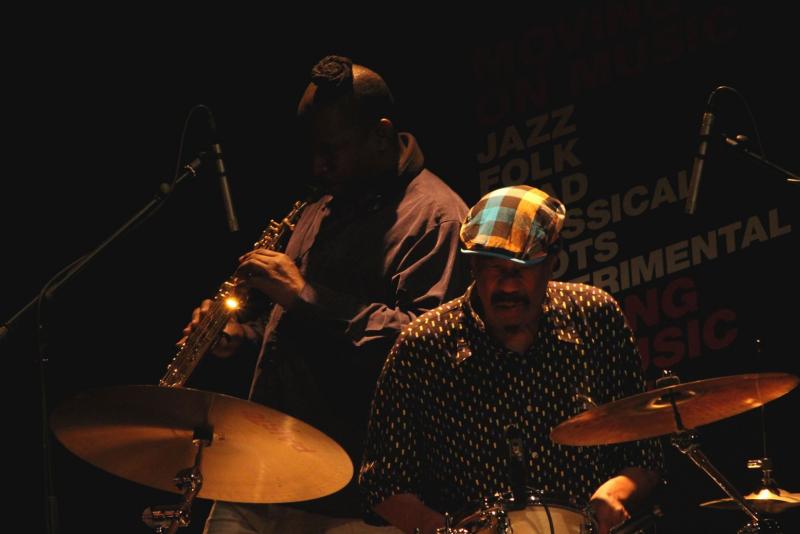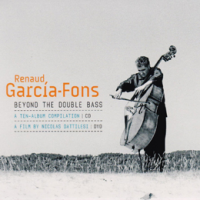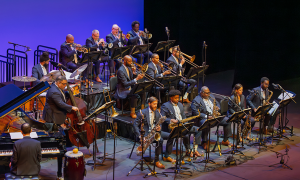Home » Jazz Articles » Live Review » Louis Moholo Moholo Quartet At The Crescent Arts Centre
Louis Moholo Moholo Quartet At The Crescent Arts Centre

The Crescent Arts Centre
Belfast
October 30, 2014
Ireland has been graced by the presence of two South African musical icons in October. First, the brilliant, seventy-five-year-old trumpeter Hugh Masekela played Dublin and then a little over a week later Louis Moholo-Moholo—younger by a year—kicked up a storm in Belfast. That Masekela was playing the 1,200 seater National Concert Hall while Moholo-Moholo played to about sixty people in an intimate club setting says something about each musician's respective journey since their exile from Apartheid South Africa in the 1960s.
Masekela's versatility matches his celebrity and he's moved effortlessly between grooving Afro-funk and jazz to million-selling Herb Alpert-esque instrumental pop. Moholo-Moholoh, by contrast, in the years since Blue Notes and the Brotherhood of Breath, has continued to align himself with adventurous spirits such as Peter Brötzmann, Cecil Taylor, John Tchicai, Irene Schweizer, Wadada Leo Smith, Paul Dunmall and Evan Parker. The quartet that the drummer brought to Belfast followed in that tradition, boasting in Alexander Hawkins, John Edwards and Jason Yarde some of the UK's leading improvisers.
Moholo-Moholo's opening snare pattern to "The Tag" was picked up first by Hawkins, then Edwards and finally by Yarde. The saxophonist was the first to break free, his soprano spiraling with abandon while the other musicians pursued intense, probing rhythms. When Yarde briefly revisited the opening melody it invited Hawkins to open the floodgates with a torrent of swirling notes and percussive exclamations. The pianist's flames slowly dimmed, quietly ushering in "Dikelelu" a rumbling number evocative of a John Coltrane spiritual—part incantation, part lament. Saxophone and piano traced the blue melody in unison while bass and drums punctuated the spaces. With the music gradually expiring, Moholo's cries of 'yeah yeah yeah" cajoled Yarde, whose renewed efforts sparked the quartet into a free-jazz workout where fizzing energy trumped form.
Yet out of the wild, thrashing maelstrom a pocket of bluesy balladry emerged, taking the form of Ralph Rogers/Leo Robin's "If I Should Lose You"—a gorgeous, snaking rendition with Yarde at his most lyrical. With the bare-bones structure once more loosening into collective free expression the potential for an eternal improvisation was present; a simple piano vamp, a punchy snare pattern, bass riff or saxophone melody being enough to lock the four on a new path of mutual discovery. A grooving Hawkin's vamp steered the quartet into a lilting South African vibe, melodious and sunny. One final burst of collective fire set the seal on a thrilling, forty five-minute workout.
The second set followed a similar pattern, with the quartet bouncing seamlessly from one tune into another. Edward's low, creaking arco, tinkling, jittery piano and Moholo-Moholo's thrusting brushwork underpinned Yarde's lyrical lines on "Lost Opportunities." Walking bass, increasingly percussive piano chords and the leader's bustling, restless drumming pushed Yarde into more expansive play.
As the collective reins loosened it was fascinating to watch the interplay between Hawkins and Moholo-Moholo; after half a dozen years playing together—also as a duo—the understanding between the two was pronounced; eye contact was frequent as sonic messages darted back and forth in exhilarating bouts of sparring. "Lost Opportunities" segued into "You Ain't Gonna Know Me 'Cos You Think You Know Me," from Moholo-Moholo's splendid Spirits Rejoice! (Ogun, 1978), leading the quartet into uplifting South African hymnal territory. As Yarde's final note gently faded, a cantering bass ostinato propelled Hawkins into a tempestuous improvisation. Moholo-Moholo, looking slightly weary, sat out for a brief respite, which given that he'd flown from South Africa via London and arrived in Belfast earlier in the day, was hardly surprising. The drummer was soon back in the saddle, locking into a fierce groove with piano and bass as Yarde squonked, screeched and brayed. From a pocket of repose Hawkins landed on a lovely piano motif, with Moholo-Moholo leading vocal harmonies as the quartet swung. The wind-down revisited gently sonorous Capetown gospel blues, which built spectacularly before veering off—via walking bass—into free territory, with Yarde riffing on alto and soprano saxophones simultaneously. A brief quartet flirtation with calypso capped another mammoth, episodic exploration.
A perfunctory encore added two minutes to the overall performance and provided an abstract and frankly unnecessary farewell.
Moholo-Moholo's creative fire still burns with the intensity of yore, inspiring the musicians around him. During a long career he may not have reaped quite the financial returns of Masekela but then again, what price music of such in-the-moment adventure? Priceless stuff from Moholo-Moholo's quartet.
Photo Credit: Orry Robinson
Tags
Louis Moholo-Moholo
Live Reviews
Ian Patterson
United Kingdom
Belfast
Hugh Masekela
Dublin
The Blue Notes
Brotherhood of Breath
Peter Brotzmann
Cecil Taylor
John Tchicai
Irene Schweizer
Wadada Leo Smith
Paul Dunmall
evan parker
Alexander Hawkins
John Edwards
Jason Yarde
John Coltrane
PREVIOUS / NEXT
Support All About Jazz
 All About Jazz has been a pillar of jazz since 1995, championing it as an art form and, more importantly, supporting the musicians who make it. Our enduring commitment has made "AAJ" one of the most culturally important websites of its kind, read by hundreds of thousands of fans, musicians and industry figures every month.
All About Jazz has been a pillar of jazz since 1995, championing it as an art form and, more importantly, supporting the musicians who make it. Our enduring commitment has made "AAJ" one of the most culturally important websites of its kind, read by hundreds of thousands of fans, musicians and industry figures every month.




























